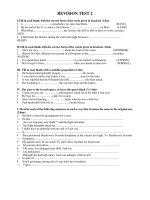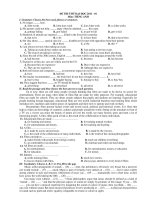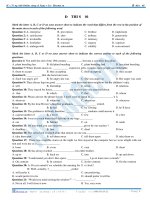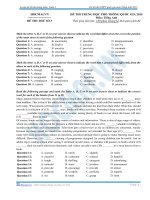ĐỀ THI THỬ TIẾNG ANH bài số 2
Bạn đang xem bản rút gọn của tài liệu. Xem và tải ngay bản đầy đủ của tài liệu tại đây (271.47 KB, 8 trang )
ĐỀ THI THỬ TỐT NGHIỆP MÔN TIẾNG ANH 2017
(Đề số 2)
* Tác giả biên soạn:
Ths. Tạ Thanh Hiền (giảng viên Hanu),
Ths. Bùi Thúy Hồng (giảng viên Đh Giao Thông Vận Tải)
* Điểm nên đạt được cho đề này: Các bạn học Khá:
Các bạn học Trung bình khá:
Các bạn học trung bình - trên trung bình:
> 8,6.
> 8.
> 7,2.
Mark the letter A, B, C, or D on your answer sheet to indicate the word whose underlined part
differs from the other three in pronunciation in each of the following questions.
Question 1. A. broad
B. load
C. road
D. boat
Question 2. A. exercise
B. exempt
C. execute
D. exclamation
Mark the letter A, B, C, or D on your answer sheet to indicate the word that differs from the
other three in the position of primary stress in each of the following questions.
Question 3. A. diverse
B. current
C. justice
D. series
Question 4. A. contrary
B. interview
C. document
D. attendance
Mark the letter A, B, C, or D on your answer sheet to indicate the word CLOSEST in meaning to
the underlined word in each of the following questions.
Question 5. You never really know where are you with her as she just blows hot and cold.
A. keeps talking
B. keeps talking things
C. keeps changing her mood
D. keeps testing
Question 6. Variations in the colour of the seawater from blue to green seen to be caused by high and
low concentrations of salt.
A. Changes
B. Description
C. Measures
D. Clarity
Mark the letter A, B, C, or D on your answer sheet to indicate the word(s) OPPOSITE in
meaning to the underlined word(s) in each of the following questions.
Question 7. The Red Cross is an international humanitarian agency dedicated to reducing the
suffering of wounded soldiers, civilians and prisoners of war.
A. happiness
B. worry and sadness
C. pain and sorrow
D. loss
Question 8. Nowadays, young children often appreciate picture stories.
A. devalue
B. estimate
C. value
D. enjoy
Mark the letter A, B, C, or D on your answer sheet to indicate the underlined part that needs
correction in each of the following questions.
Question 9. Unlike other architects of the early modern movement, Alva Alto stressed informality,
A
B
C
personal expression, romantic, and regionality in his work.
D
Question 10. It announced today that an enquiry would be held into the collapse of a high-rise
A
B
C
apartment block in Kuala Lumpur last week.
D
Question 11. It is important that you turned off the heater every morning before you leave for class.
A
B
C
D
Mark the letter A, B, C, or D on your answer sheet to indicate the correct answer to each of the
following questions.
Question 12. I'm sorry! I didn't break that vase on _______.
A. my mind
B. time
C. purpose
D. intention
Question 13. The success of the party was mainly due to the presence of several _______.
A. celebrations
B. celebrities
C. celebrates
D. celebrated
Question 14. Hieroglyphics _______ on the walls of caves provide scientists with important details on
prehistoric man.
A. painted
B. were painted
C. have been painted D. that they painted
Question 15. _______ to school by bus as they are not old enough to ride motorbikes.
A. Many the students
B. many a students goes
C. many of the students goes
D. much students go
Question 16. He has been given work as a window cleaner even though he is no _______ for height.
A. head
B. skill
C. ability
D. balance
Question 17. Her new novel is _______ out next month.
A. bringing
B. going
C. coming
D. taking
Question 18. Make sure you book a ticket in _______.
A. ahead
B. advance
C. forward
D. before
Question 19. I'm in two _______ about whether to go to the wedding or not.
A. brains
B. minds
C. thoughts
D. heads
Question 20. I can't help _______ that Charlotte would look better if she lost some weight.
A. to thinking
B. to think
C. thinking
D. think
Question 21. I hope I can _______ you to be there if I need any help.
A. let down
B. make out
C. get through
D. count on
Question 22. The explanation _______ for the problems didn't satisfy anybody.
A. giving
B. which gave
C. given
D. having given
Question 23. It's about time you _______ yourself a job.
A. got
B. get
C. will get
D. had not
Read the following passage and mark the letter A, B, C, or D on your answer sheet to indicate
the correct word or phrase that best fits each of the numbered blanks from 24 to 28.
The expression on your face can actually dramatically alter your feelings and perceptions, and
it has been proved that delibrately smiling or frowning can create corresponding emotional responses.
The idea was first (24) _______ by a French physiologist, Israel Waynbaum, in 1906. He believed that
different facial (25) ________ affected the flow of blood to the brain, and that this could create
positive or negative feelings. A happy smile or irrepressible laughter increased the blood flow and
contributed to joyful feelings. However, sad, angry expressions decreased the flow of oxygen-carrying
blood, and created a vicious (26) _______ of gloom and depression by effectively starving the brain of
essential fuel.
Psychologist Robert Zajonc rediscovered this early research, and suggests that the temperature
of the brain could affect the production and synthesis of neurotransmitters - which definitely influence
our moods and energy levels. He argues that an impaired blood flow could not only deprive the brain
of oxygen, but create further chemical imbalance (27) ________ inhibiting these vital hormonal
messages. Zajonc goes on to propose that our brains remember that smiling is associated with being
happy, and that by deliberately smiling through your tears you can (28)_________ your brain to
release uplifting neurotransmitters — replacing a depressed condition with a happier one. People
suffering from psychosomatic ailment, depression and anxiety states could benefit from simply
exercising their zygomatic muscles which pull the corners of the mouth up and back to form a smile —
several times an hour.
Question 24. A. put off
B. put down
C. put by
D. put forward
Question 25. A. aspects
B. looks
C. expressions
D. appearances
Question 26. A. cycle
B. spiral
C. circle
D. ring
Question 27. A. by
B. without
C. when
D. from
Question 28. A. make
B. persuade
C. let
D. decide
Read the following passage and mark the letter A, B, C, or D on your answer sheet to indicate
the correct answer to each of the questions from 29 to 35.
The concept of obtaining fresh water from iceberg that are towed to populated areas and
arid regions of the world was once treated as a joke more appropriate to cartoons than real life.
But now it is being considered quite seriously by many nations, especially since scientists have
warned that the human race will outgrow its fresh water supply faster than it runs out of food.
Glaciers are a possible source of fresh water that have been overlooked until recently.
Three-quarters of the Earth's fresh water supply is still tied up in glacial ice, a reservoir
of untapped fresh water so immense that it could sustain all the rivers of the world for 1,000
years. Floating on the oceans every year are 7,659 trillion metric tons of ice encased in 10,000
icebergsthat break away from the polar ice caps, more than ninety percent of them from Antarctica.
Huge glaciers that stretch over the shallow continental shelf give birth to icebergs
throughout the year. Icebergs are not like sea ice, which is formed when the sea itself freezes ; rather,
they are formed entirely on land, breaking off when glaciers spread over the sea. As they drift
away from the polar region, icebergs sometimes move mysteriously in a direction opposite to the
wind, pulled by subsurface currents. Because they melt more slowly than smaller pieces of ice,
icebergs have been known to drift as far north as 35 degrees south of the equator in the Atlantic Ocean.
The corral them and steer them to parts of the world where they are needed would not be too difficult.
The difficulty arises in other technical matters, such as the prevention of rapid melting
in warmer climates and the funneling of fresh water to shore in great volume. But even if the icebergs
lost half of their volume in towing, the water they could provide would be far cheaper than that
produced by desalination, or removing salt from water.
Question 29. What is the main topic of the passage?
A. The movement of glaciers
B. Icebergs as a source of fresh water
C. Future water shortages
D. The future of the world's rivers
Question 30. The word “appropriate” in paragraph 1 is closest in meaning to _______
A. proper
B. enjoyable
C. suitable
D. decent
Question 31. According to the author, most of the world's fresh water is to be found in _______.
A. oceans
B. rivers
C. glaciers
D. reservoirs
Question 32. The word “currents” in paragraph 3 is closest in meaning to _______.
A. pulls
B. waves
C. weather
D, flows of water
Question 33. How are icebergs formed?
A. They break off from glaciers
C. Rivers freeze
B. Seawater freezes
D. Small pieces of floating ice converge
Question 34. With which of the following ideas would the author be likely to agree?
A. Towing icebergs to dry areas is economically possible.
B. Desalination of water is the best way to obtain drinking water.
C. Using water from icebergs is a very short-term solution to water shortages.
D. Icebergs could not be towed very far before they would melt.
Question 35. The word "that" in the last line refers to _______.
A. the volume
B. the water
C. the iceberg
D. the towing
Read the following passage and mark the letter A, B, C, or D on your answer sheet to indicate
the correct answer to each of the questions from 41 to 50.
In my experience, freshmen today are different from those I knew when I started as a counselor
and professor 25 years ago. College has always been demanding both academically and socially. But
students now are less mature and often not ready for the responsibility of being in college.
It is really too easy to point the finger at parents who protect their children from life’s obstacle.
Parents, who handle every difficulty and every other responsibility for their children writing
admission essays to picking college courses, certainly may contribute to their children’s lack of coping
strategies. But we can look even more broadly to the social trends of today.
How many people do you know who are on medication to prevent anxiety or depression? The
number of students who arrive at college already medicated for unwanted emotions has increased
dramatically in the past 10 years. We, as a society, don’t want to “feel” anything unpleasant and we
certainly don’t want our children to “suffer”.
The resulting problem is that by not experiencing negative emotions, one does not learn the
necessary skills to tolerate and negotiate adversity. As a psychologist, I am well aware of the fact that
some individuals suffer from depression and anxiety and can benefit from treatment, but I question the
growing number of medicated adolescents today.
Our world is more stressful in general because of the current economic and political realities,
but I don’t believe that the college experience itself is more intense today that that of the past 10 years.
What I do think is that many students are often not prepared to be young “adults” with all the
responsibilities of life.
What does this mean for college faculty and staff? We are required to assist in the basic
parenting of these students – the student who complains that the professor didn’t remind her of the due
date for an assignment that was clearly listed on the syllabus and the student who cheats on an
assignment in spite of careful instructions about plagiarism.
As college professors, we have to explain what it means to be an independent college student
before we can even begin to teach. As parents and teachers we should expect young people to meet
challenges. To encourage them in this direction, we have to step back and let them fail and pick
themselves up and move forward. This approach needs to begin at an early age so that college can
actually be a passage to independent adulthood.
Question 36. According to the writer, students today are different from those she knew in that they are
_____.
A. not so academic
B. responsible for their work
C. too ready for college
D. not as mature
Question 37. The word “handle” in paragraph 2 mostly means _______.
A. point at
B. deal with
C. lend a hand to
D. gain benefits from
Question 38. According to the writer, students’ difficulties to cope with college life are partly due to
______.
A. the lack of financial support
B. the over – parenting from parents
C. the absence of parents’ protection
D. the lack of parental support
Question 39. The phrase “on medication” in paragraph 3 is similar in meaning to ______.
A. receiving medical treatment
B. suffering anxiety or depression
C. doing medical research
D. studying medicine at college
Question 40. Which of the following is NOT TRUE according to the passage?
A. The college experience itself is more intense today than that of the past 10 years.
B. Our world is more stressful because of the current economic and political situation.
C. College faculty and staff are required to help in the parenting of problematic students.
D. Our society certainly doesn’t want our children to experience unpleasant things.
Question 41. The word “them” in the last paragraph refers to _____.
D. college professors A. young people
B. teachers
C. parents
Question 42. According to the writer, failure in life and less support from parents will ______.
A. defeat students from the very beginning.
B. help students to learn to stand on their own feet.
C. discourage students and let them down forever.
D. allow students to learn the first lesson in their lives.
Question 43. What is probably the writer’s attitude in the passage?
A. Indifferent
B. Praising
C. Critical
D. Humorous
Mark the letter A, B, C, or D on your answer sheet to indicate the most suitable response to
complete each of the following exchanges.
Question 44. Thanks a lot for a lovely dinner. Bye! - “_______”
A. You will be welcome!
B. Never mind!
C. Safe and sound!
D. You must come again!
Question 45. Do you find it interesting to go to the cinema on your own? - “_______”
A. No, not at all.
B. What a pity!
C. Never mind.
D. You’re welcome.
Mark the letter A, B, C, or D on your answer sheet to indicate the sentence that is closest in
meaning to each of the following questions.
Question 46. As long as you stay calm, you have nothing to fear from the interview.
A. You have remained calm for a long time in spite of your fear of the interview.
B. Interviews are only intimidating for people who are not extremely calm.
C. Provided you do not get nervous, the interview won't go badly for you.
D. Even if you are afraid of the interview, it is important not to let it show.
Question 47. “I will let you know the answer by the end of the week.” Tim said to Jane.
A. Tim suggested giving Jane the answer by the end of the week.
B. Tim promised to give Jane the answer by the end of the week.
C. Tim insisted on letting Jane know the answer by the end of the week.
D. Tim offered to give Jane the answer by the end of the week.
Question 48. The friends promised to stand by each other through thick and thin.
A. The friends promised to stand together all their life.
B. The friends promised to work together in spite of all difficulties.
C. The friends promised to stand by each other whatever happened.
D. The friends promised to hold on together if possible.
Mark the letter A, B, C, or D on your answer sheet to indicate the sentence that best combines
each pair of sentences in the following questions.
Question 49. He was suspected to have stolen credit cards. The police have investigated him for days.
A. He has been investigated for days, suspected to have stolen credit cards.
B. Suspecting to have stolen credit cards, he has been investigated for days.
C. Having suspected to have stolen credit cards, he has been investigated for days.
D. Suspected to have stolen credit cards, he has been investigated for days.
Question 50. She buys a lot of new dresses every month. She always dresses shabbily.
A. However a lot of new dresses she buys every month, she always dresses shabbily.
B. Many as new dresses she buys every month, she always dresses shabbily.
C. She always dresses shabbily although she buys a lot of new dresses every month.
D. However many new dresses she buys every month, she always dresses shabbily.
ĐÁP ÁN
* Sách gốc của cô Hiền có lời giải chi tiết, nhưng tôn trọng sách của cô, anh chỉ để đáp án chay. Các
bạn có thể mua sách cô để có được phần chi tiết.
1. A
11. B
21. D
31. C
41. B
2. B
12. C
22. C
32. D
42. B
3. A
13. B
23. A
33. A
43. C
4. D
14. A
24. D
34. A
44. C
5. C
15. B
25. C
35. B
45. A
6. A
16. A
26. C
36. D
46. C
7. A
17. C
27. A
37. B
47. B
8. A
18. B
28. C
38. B
48. C
9. D
19. B
29. B
39. A
49. D
10. A
20. C
30. C
40. A
50, D
* Các cấu trúc cần lưu ý:
5. blow hots and cold: hay thay đổi tâm trạng, thái độ.
9. romantic => romance
10. It announced => It was announced
11. turned off => turn off
13. celebrities = những người nổi tiếng (thường là trong lĩnh vực giải trí hay thể thao)
15. MANY + A/AN + N-số ít + V-chia theo số ít = MANY + N-số nhiều + V-chia theo số nhiều.
=> đều là NHIỀU. <=> Many a student goes = Many students go.
16. have no head for heights: sợ độ cao >< have a head for heights: không sợ độ cao.
17. come out: (sách) xuất bản, phát hành
19. be in two MINDS about sth: lưỡng lự.
21. count on sb to do: tin tưởng ai làm gì.
24. put forward an idea: đề ra ý tưởng
25. facial expressions: nét mặt, sự biểu cảm của khuôn mặt
26. cycle of sth: vòng luẩn quẩn của cái gì.
44. safe and sound: Chúc bình an vô sự (dùng khi tạm biệt ai).
48. through thích and thin = dù bất kỳ chuyện gì xảy ra = whatever happened (trong câu)









